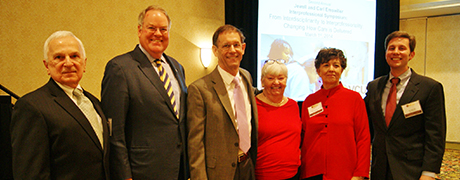Living the education-practice "Nexus" in Virginia
Recently, I visited Virginia Commonwealth University to participate in the Emswiller Symposium, an interprofessional, multi-institutional meeting supported by Jewell Emswiller in memory of her husband, Carl. During the visit I learned that Carl, a pharmacist, had been a trailblazer in promoting interprofessional team work in his community of Winchester, Va. I’m certain that Carl would have loved the energy of the meeting in his honor.
I connected with old friends and met new ones. I enjoyed visiting with Vic Yanchick, dean of pharmacy, whom I’ve known for many years, and David Musick from Virginia Tech Carilion. Paul Mazmazian, a nationally known educational evaluator, and I first met more than two decades ago. He and an energetic interprofessional team, led by Pam Parsons, a geriatric nurse practitioner, are working together on a HRSA interprofessional practice grant, sending teams of students into living centers serving low-income seniors. As a faculty – student IPE team, they are providing valuable care to keep elders aging in place rather than transitioning to higher cost nursing home settings because of increasing debility. Along the way, they are collecting data to demonstrate how student teams make a difference in the lives of these seniors by improving health outcomes and lowering costs. I was inspired by meeting with Lana Sargent, another nurse practitioner, and Kelechi Ogbonna, a pharmacist, who are also faculty involved in the project.
Alan Dow, assistant vice president, oversees all of the VCU efforts through the Center for Interprofessional Education and Collaborative Care. I became familiar with one effort in teaching geriatric team-based care last fall. The Reynolds Foundation is supporting a VCU team led by Peter Boling to develop an innovative case-based IPE computer application. This remarkable program, now required of all senior VCU students in medicine, nursing, pharmacy, and social work, allows the students to work on team-based cases asynchronously and from the viewpoint of various roles. The approach demonstrates the power of the team and the limits of independent professional expertise to solve complex problems alone. I’m certain you will be hearing more about this work.

(Left to right) Dr. Victor Yanchick, dean, VCU School of Pharmacy; Dr. William Hazel, secretary of Health and Human Resources, Commonwealth of Virginia; Dr. Sheldon Retchin, senior vice president for health sciences, VCU/COE/VCU Health Systems; Jewell Emswiller, wife of Dr. Carl Emswiller; Barbara Brandt, PhD, National Center director; and Dr. Alan Dow, assistant vice president of health sciences for interprofessional education and collaborative care, VCU
I learn so much about practice, the “Nexus” and education when I have the opportunity to visit with interprofessional practitioners and educators. VCU was no different. After giving a presentation about National Center, I ended my day in Richmond on a panel with two provocateurs: Sheldon M. Retchin, MD, MSPH, senior vice president for health sciences at VCU and the CEO of the VCU Health System, and Virginia’s Secretary of Health and Human Services William Hazel, MD. These are senior leaders who think about the care delivery system 24/7. The audience and panel generated many questions and comments about teams and interprofessional practice and education, including:
- Teams are costly and really only valuable in small populations, such as frail elderly populations. Where should we focus our team-based practice efforts for the highest impact?
- There are many vibrant teams functioning every day now in the health care delivery system – such as transplant and renal teams in acute care settings. Often, these teams are not recognized or understood. How can these teams be showcased?
- In places where such teams are working well together, how do we incorporate students so teams can role model these skills? And, students can have meaningful roles on high-funding teams to learn how to collaborate in their future practice?
All good points to ponder.
To learn more about the excellent work at Virginia Commonwealth University, visit:
- http://wp.vcu.edu/cipe/
- VanderWeilen, L., Do, E., Diallo, H., Lacoe, K., Nguyen, N., Parikh, S., Rho, H., Enurah, A., Dumke, E., Dow, A. (2014). Interprofessional Collaboration Led by Health Professional Students: A Case Study of the Inter Health Professional Alliance at Virginia Commonwealth University. Journal of Research in Interprofessional Practice and Education, 3(3).
- Thibault, G. (2013). The Role of Private Foundations in Addressing Health Care Workforce Needs. Academic Medicine, 88(12). 1804-1805.

Start the Conversation
Every registered user can comment on website content.
Please login or register to comment